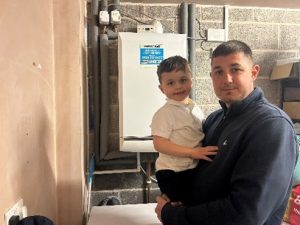A local gas company has reported that it was called out to 94 properties in Leeds during the first three months of this year, to respond to confirmed or suspected cases of carbon monoxide (CO) following calls to the National Gas Emergency helpline. 289 visits were made to properties in Yorkshire between January to March 2025.

One of those visits was to Kris Dillon, a busy dad of three young children from Leeds. When a beeping carbon monoxide alarm kept going off in his home at the beginning of the year, he was forced to take action.
“Our boiler is situated in an internal garage above my eight-year-old son’s bedroom.” Kris explains. “My wife called me one day to explain that the carbon monoxide alarm that we have in the garage was randomly beeping. I just thought it was the batteries, so asked her to replace it with new ones and see if it stopped. When she called back to say it was still beeping and had been for the past 20 minutes, we googled what to do and called the National Gas Emergency helpline.
“An engineer from Northern Gas Networks arrived within 20 minutes of us making the call. They did a gas reading and confirmed that carbon monoxide was present in the room and that the reading was quite high. I was shocked.”
The emergency response engineer then capped the gas in Kris’s home to make it safe until a Gas Safe registered engineer could come out to fix the problem.
“NGN offered us electric heaters and a stove while our gas was off, and extra blankets to keep warm. The following day, someone came to service the boiler and confirmed that carbon monoxide was no longer leaking from it, reassuring us by taking several further readings.”
Kris and wife Carly had had the same boiler in place since buying their home seven years ago. “It was the original boiler that was in there when we bought the house but it isn’t particularly old and it’s a reputable brand. We’d had it serviced a few times, but it was due another service last year and we forgot. You just put these things to the back of your mind and think it won’t happen to you. This was a wake-up call.”
Kris’s son, whose bedroom is above the garage, had complained of feeling unwell the night before the CO alarm started beeping. “Looking back, we wonder if that was down to the gas being emitted and we didn’t know. It’s scary to think what could’ve happened if we hadn’t had an alarm in there.”
Kris and Carly have since bought more carbon monoxide alarms and put them on every floor of the house on NGN’s advice and scheduled in reminders for an annual boiler service and chimney sweep. “It’s just not worth the risk. Please check your appliances and get a CO alarm. It could save your life.”
For more tips to stay safe from the dangers of carbon monoxide, visit www.northerngasnetworks.co.uk/cohero.
Carbon monoxide poisoning kills around 60 people and hospitalises 4,000 every year in the UK. Recent research conducted by NGN revealed that only 37 percent of people in the NGN regions (Yorkshire, Cumbria, and the North East) have a working CO alarm in their property, and only 24 percent regularly test it. 19 percent said they would do nothing if they heard their CO alarm beeping, while nine percent admit they’ve never had their boiler serviced.
Eileen Brown, Director of Customer Experience at Northern Gas Networks, said: “It’s worrying how many people we’ve had to visit in Leeds so far this year because of suspected carbon monoxide poisoning. Similar to a smoke alarm, CO alarms are activated when CO is detected in the air and will beep and flash to alert you of the danger. They’re small and easy to install, and you should have at least one on each floor. If you have a gas fire, log burner or open fire, it’s a good idea to have one in the room it’s in, too.”
Carbon monoxide is a poisonous, colourless and odourless gas that is produced when carbon fuels are burnt. It can leak from incorrectly fitted, badly repaired or poorly maintained gas appliances, as well as flues, chimneys and blocked vents. You can’t see or smell it, so you can’t detect it if it begins to build up in your home, and if you breathe it in, it can make you seriously ill.
The signs of CO poisoning include headaches, dizziness, nausea, breathlessness, collapse or loss of consciousness. If you think you may have carbon monoxide poisoning, immediately turn off the appliance you think may be causing it, open windows and doors, leave the building and seek urgent medical advice. You must also call the National Gas Emergency Service on 0800 111 999 and an engineer will come straight out to investigate and make the situation safe. This line is in operation 24 hours a day, 365 days a year.
Show less






